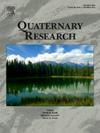Holocene evolution of parabolic dunes, White River Badlands, South Dakota, USA, revealed by high-resolution mapping
IF 1.8
3区 地球科学
Q3 GEOGRAPHY, PHYSICAL
引用次数: 1
Abstract
Abstract The White River Badlands (WRB) of South Dakota record eolian activity spanning the late Pleistocene through the latest Holocene (21 ka to modern), reflecting the effects of the last glacial period and Holocene climate fluctuations (Holocene Thermal Maximum, Medieval Climate Anomaly, and Little Ice Age). The WRB dune fields are important paleoclimate indicators in an area of the Great Plains with few climate proxies. The goal of this study is to use 1 m/pixel-resolution digital elevation models from drone imagery to distinguish Early to Middle Holocene parabolic dunes from Late Holocene parabolic dunes. Results indicate that relative ages of dunes are distinguished by slope and roughness (terrain ruggedness index). Morphological differences are attributed to postdepositional wind erosion, soil formation, and mass wasting. Early to Middle Holocene and Late Holocene paleowind directions, 324°± 13.1° (N = 7) and 323° ± 3.0° (N = 19), respectively, are similar to the modern wind regime. Results suggest significant landscape resilience to wind erosion, which resulted in preservation of a mosaic of Early and Late Holocene parabolic dunes. Quantification of dune characteristics will help refine the chronology of eolian activity in the WRB, provide insight into drought-driven landscape evolution, and integrate WRB eolian activity in a regional paleoenvironmental context.美国南达科他州白河荒地抛物状沙丘的全新世演化
摘要南达科他州的White River Badlands(WRB)记录了从更新世晚期到最近的全新世(21 ka到现代)的风活动,反映了最后一次冰川期和全新世气候波动(全新世热盛期、中世纪气候异常和小冰期)的影响。WRB沙丘区是大平原一个气候指标很少的地区的重要古气候指标。本研究的目标是使用无人机图像中的1米/像素分辨率数字高程模型来区分全新世早期至中期的抛物线沙丘和全新世晚期的抛物线沙丘。结果表明,沙丘的相对年龄以坡度和粗糙度(地形粗糙度指数)来区分。形态差异归因于沉积后的风蚀、土壤形成和物质浪费。全新世早期至中期和全新世晚期的古风向分别为324°±13.1°(N=7)和323°±3.0°(N=19),与现代风况相似。结果表明,景观对风蚀具有显著的恢复力,从而保存了全新世早期和晚期抛物线沙丘的马赛克。沙丘特征的量化将有助于完善WRB中风成活动的年表,深入了解干旱驱动的景观演变,并将WRB风成活动整合到区域古环境背景中。
本文章由计算机程序翻译,如有差异,请以英文原文为准。
求助全文
约1分钟内获得全文
求助全文
来源期刊

Quaternary Research
地学-地球科学综合
CiteScore
4.70
自引率
8.70%
发文量
57
审稿时长
3 months
期刊介绍:
Quaternary Research is an international journal devoted to the advancement of the interdisciplinary understanding of the Quaternary Period. We aim to publish articles of broad interest with relevance to more than one discipline, and that constitute a significant new contribution to Quaternary science. The journal’s scope is global, building on its nearly 50-year history in advancing the understanding of earth and human history through interdisciplinary study of the last 2.6 million years.
 求助内容:
求助内容: 应助结果提醒方式:
应助结果提醒方式:


